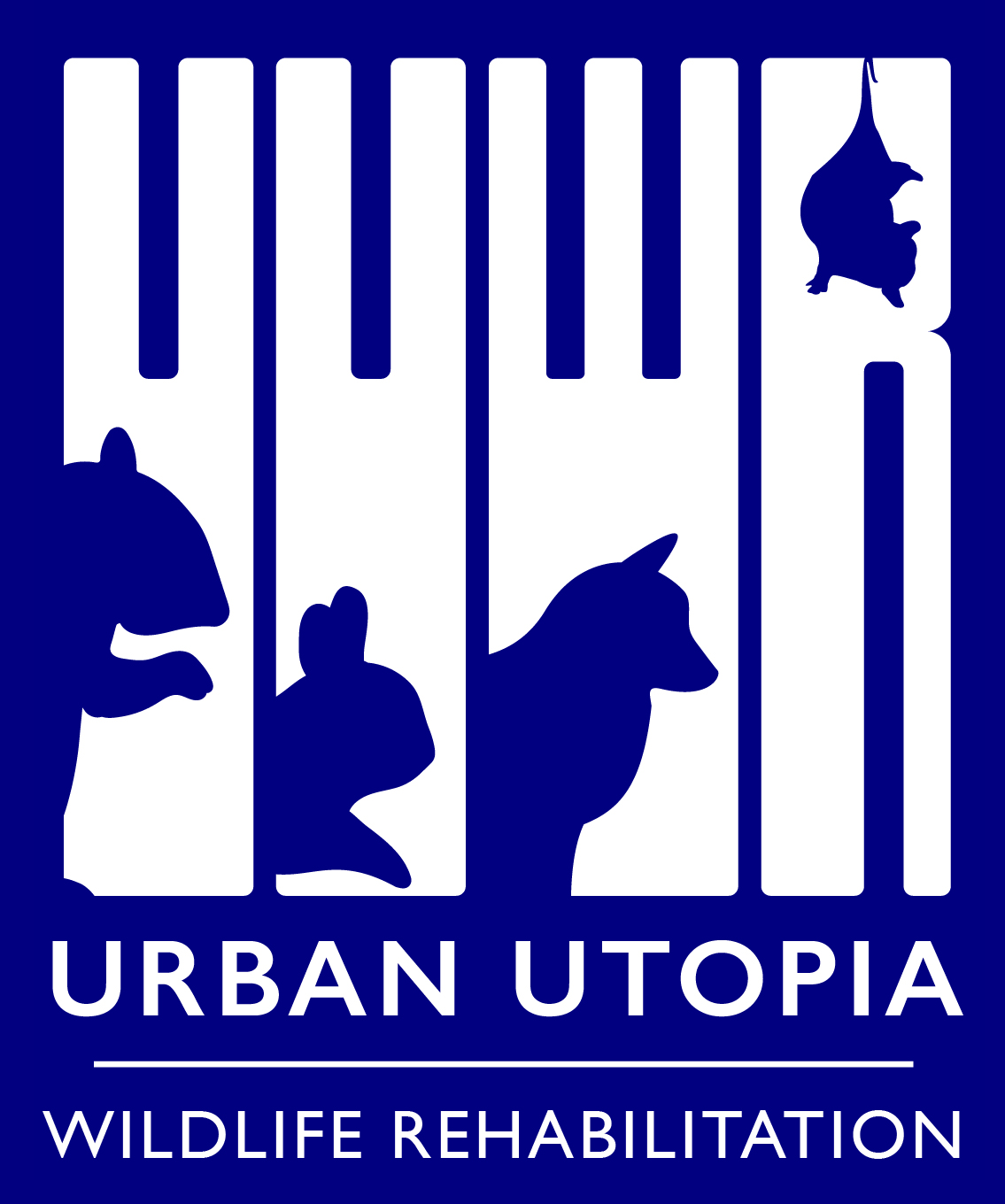Frequently Asked Questions
+ Where can I find a rehabber in my area, outside NYC?
To find a wildlife rehabilitator in New York State check the NY DEC rehabber contact list. To find a rehabber in other states contact your State Department of Environmental Conservation, or call the National Wildlife Rehabilitators Association at (320) 230-9920.
+ Where is Urban Utopia Wildlife Rehabilitation located?
UUWR does not have its own facility yet. Right now the animals we rehabilitate are cared for in the private NYC spaces of licensed rehabilitators, which is why our current capacity is very small. We hope to one day open a fully operational rehabilitation center.
+ What kinds of animals do you rehab?
We currently rehabilitate small wild mammals and marsupials (ie squirrels, opossums, chipmunks, etc.). Because we do not yet have a dedicated rehabilitation center our capacity is very limited; we are not currently able to accept birds or large mammals, and we are not licensed to accept Rabies Vector Species -bats, raccoons, or skunks.
+ My neighbor is poisoning squirrels or other wildlife, keeping wildlife illegally, or otherwise abusing wildlife. What can I do?
Please call the DEC law enforcement dispatch line: 844-DEC-ECOS (844-332-3267) or report it with this online form. For cases of animal abuse, call 911 and ask to speak to the NYPD Animal Cruelty Unit.
+ I see a distressed animal - can you come pick it up?
Due to our very limited resources we are currently unable to facilitate pick-ups.
+ I need help getting an animal off a glue trap
If you found protected wildlife, please take the whole trap to a licensed wildlife rehabber, or follow their instructions. However if you are trying to remove a mouse, please follow these directions. Pour the oil on the trap, and not the animal. Most sites say to contact a rehabber to remove the oil, but not many rehabilitators in NYC accept house mice. They aren’t regulated or protected species, so there’s no need for it here. Just carefully blot off as much oil as possible, then a gentle scrub with dish detergent and rinse. Q-tips are helpful! Do not release the animal covered in oil or soaking wet- this will likely be fatal. Fully dry, then release nearby!
+ How do I humanely evict an animal from my attic/garage/porch/etc.?
For excellent resources on dealing with "problem" wildlife, please visit our friends' at the Toronto Wildlife Center. For a list of rehabilitator-run pest control companies visit Humane Wildlife Control. Locally, we have heard good things about Quality Pro Pest & Wildlife Services, NY & NJ Wildlife Removal Company, and Able Wildlife. Trapping and removing the animal is almost NEVER the solution, but rather it is important to make your home an unappealing and inaccessible place for the animal to nest.
+ Why do you care for squirrels and other pests?
We do not consider squirrels, opossums, and other wildlife pests, but rather important members of our ecosystem.
+ Can your animals use my old fur coats?
We don't use fur coats becasue they cannot be sanitized. Please try Coats For Cubs.
+ Are you an animal shelter or sanctuary?
We are neither. The goal of wildlife rehabilitation is to release animals back into the wild. Keeping wild animals in captivity is illegal except in rare cases where special licenses are granted.
+ What is a licensed wildlife rehabilitator?
A licensed wildlife rehabber is an individual licensed by their state to possess injured, orphaned, sick, and otherwise distressed wildlife for the purpose of caring for them and returning them to the wild. Wildlife rehabbers are specially trained to care for these animals, and are required to abide by state and federal laws regarding wildlife possession, care, and release. Remember, it is illegal to possess wildlife if you are not a licensed wildlife rehabilitator.
+ How do I become a wildlife rehabilitator?
To apply for a Class I wildlife rehabilitation license contact your State Dept of Environmental Conservation for an application and details. For NY residents that info is here.
+ What is an RVS or Rabies Vector Species animal?
Bats, raccoons, and skunks are classified as Rabies Vector Species in NY, and wildlife rehabilitators need a Rabies Vector Species License to possess and rehabilitate them. Even though RVS have higher rates of rabies than other animals, any mammal can have rabies. If you have come in contact with a rabies vector species contact your doctor immediately.
+ Does UUWR "rehabilitate" pets?
No, we only work with wildlife. If you find a sick or injured pet or domestic animal, please contact a local veterinarian or animal shelter.
+ How do I volunteer or support UUWR?
For information on helping UUWR visit our Get Involved page.
photo credit shaina fishman
Follow these links to more sites featuring information about wildlife rehabilitation.
National Wildlife Rehabilitation Association - http://www.nwrawildlife.org/
New York State Wildlife Rehabilitation Council - http://nyswrc.org/
Tristate Bird Rescue and Research - https://tristatebird.org/
International Wildlife Rehabilitation Council - https://theiwrc.org/
New York State Wildlife Rehabilitation Council, Inc (NYSWRC) - http://www.nyswrc.org/
New York State Department of Environmental Conservation - http://www.dec.ny.gov/index.html
National Wildlife Federation - http://www.nwf.org/
World Wildlife Fund - http://worldwildlife.org/
Interested in pursuing a career with animals but not sure where to start? Visit the Careers with Animals guide at https://www.moneygeek.com/careers/careers-with-animals/

